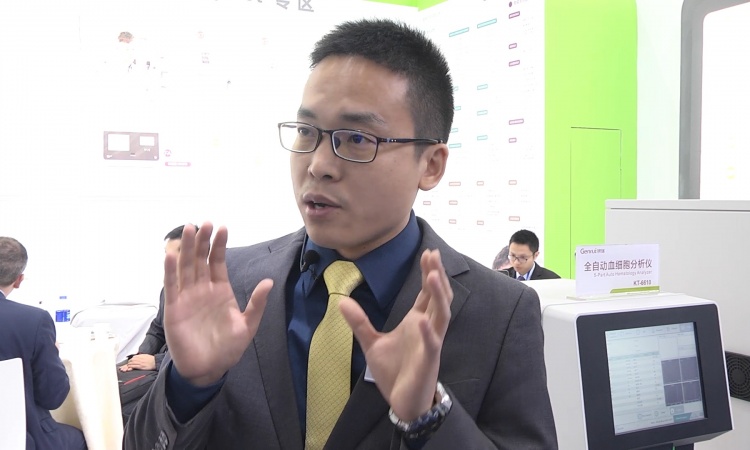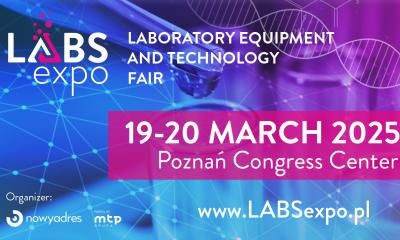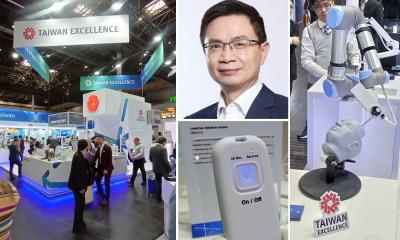Photo: HiE/Behrends
Article • Medical Taiwan 2025: Company and product showcase
Transformative health solutions on display in Taipei
Assistants for IV needle placement, advanced solutions for endoscopy, wound care and blood sampling, powerful AI tools to analyze medical images and reduce animal testing, and more: At Medical Taiwan 2025, manufacturers attracted attendees with a wide range of innovations. We took a closer look at some of the most exciting companies and their products on display at the medical, health and care expo – in alphabetical order.
Adison Biotechnology Co., Ltd.
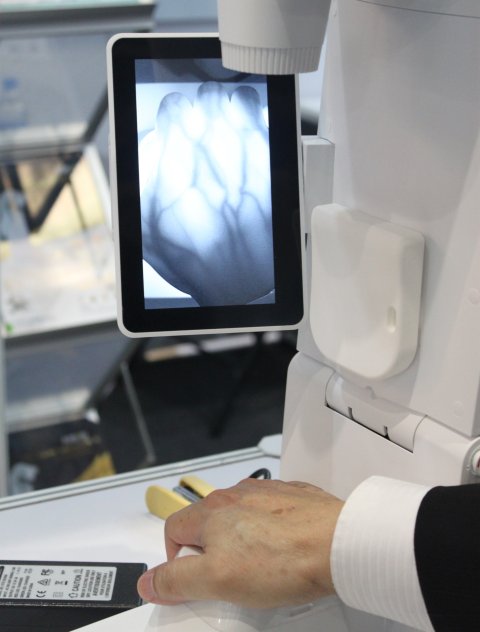
Photo: HiE/Behrends
Any person who has had an intravenous (IV) cannula inserted on the back of their hand will confirm that missing the vein is an unpleasant experience. To prevent this, Taiwanese company Adison Biotechnology has developed a solution called Vein Viewer Locator. The highly mobile and user-friendly device works by simply placing the hand above its multi-mode light source, instantly revealing the location of veins beneath the skin for easy needle positioning. Not only does this prevent tissue damage and reduces potential infection sites, but also helps locate any obstructions to the blood flow. As the company points out, the device is equipped with an adjustable display to provide flexibility, for example in an emergency medicine setting.
Anivance AI Corporation Ltd.
Artificial intelligence (AI) shows great promise in replacing animal testing for drug discovery and development. This potential is explored by Anivance AI, developers of an AI agent-powered organ-on-a-chip platform, who provide pharmaceutical companies with a scalable, self-optimizing solution that aims to accelerate preclinical testing and deliver breakthrough research insights. The module-based system leverages large language models (LLM) to assist in every stage of experimentation, the company states, ranging from protocol generation to real-time monitoring and data analysis. Further, the platform is designed to enable the construction of complex, multi-tissue models that replicate organ-level functions. The system, which has already seen recognition in technology competitions across Taiwan and Europe, supports large-scale testing and provides insights into drug Mechanism of Action (MOA).
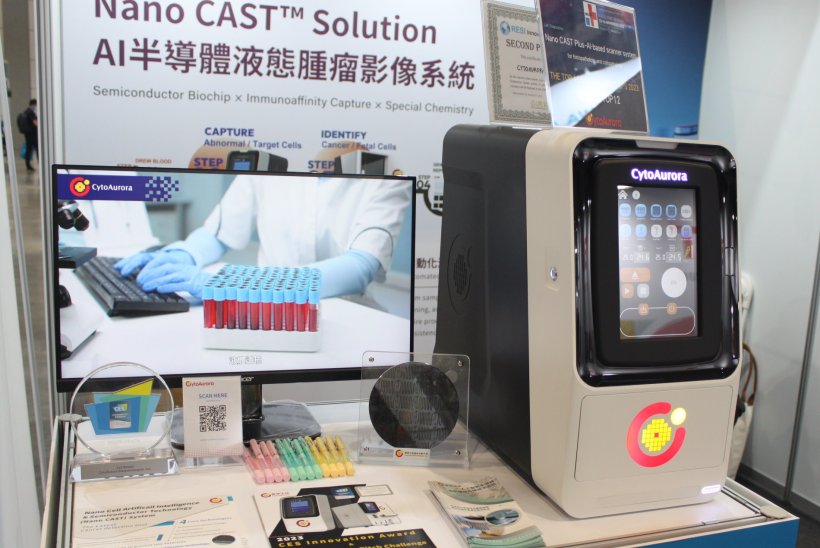
Photo: HiE/Behrends
CytoAurora Biotechnologies, Inc.
Designed to drive the future of precision medicine, biotechnology company CytoAurora presented its NanoCast Cell Reveal system at Medical Taiwan. The core technology, which already attracted international attention at the MEDICA Start-Up Competition, efficiently captures and analyzes cancer cells from blood samples in a fully automated workflow, the company’s Vice President, Bryan Tang, PhD, explained. After the sample is obtained from the patient, the semiconductor microfluidic chip captures abnormal cells, which are then classified using AI to detect cancer. Finally, the system generates a comprehensive and detailed report of its findings. This approach significantly shortens diagnostic time, greatly boosting efficiency compared to traditional imaging scans such as MRI and CT, the manufacturer states, adding that this not only enables early cancer screening but also allows for real-time monitoring of treatment efficacy, providing patients with more precise, personalized treatment plans.
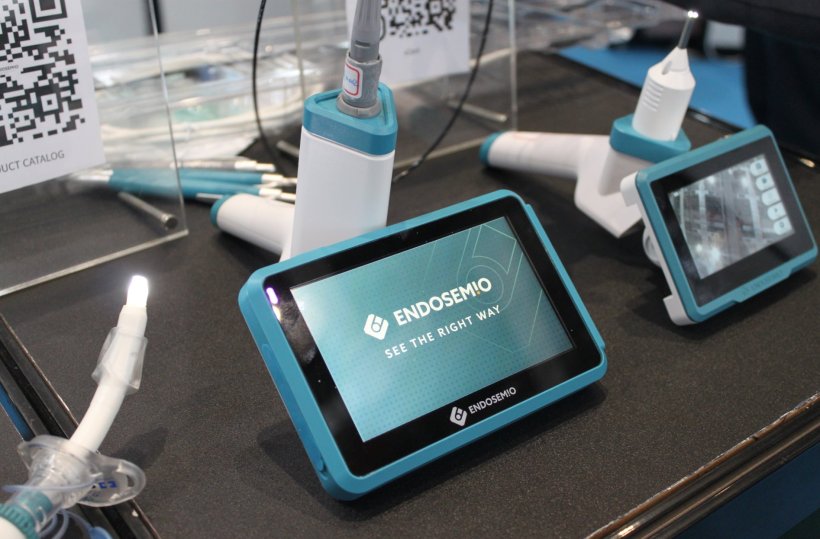
Photo: HiE/Behrends
EndoSemio Co. Ltd.
Specializing in single-use endoscopic imaging products, NTU spin-out company EndoSemio showcased a range of solutions for use across multiple applications. The product portfolio, which includes a tracheostomy kit for emergency situations, an ureteroscope with enhanced flexibility to circumvent obstacles, and a respiratory tract imaging kit for neonatal and paediatric patients, features the company’s ultra-fine tubing and a magnet-based, modular design for easy handling, explained Program Manager Elena Chin. Further, the single-use design eliminates the need for repeated cleaning and disinfection, reducing the risk of cross-infection among patients, she pointed out. Currently, the company is planning to introduce AI technology to their product lineup to assist with early cancer detection.
Medimaging Integrated Solution Inc. (MiiS)
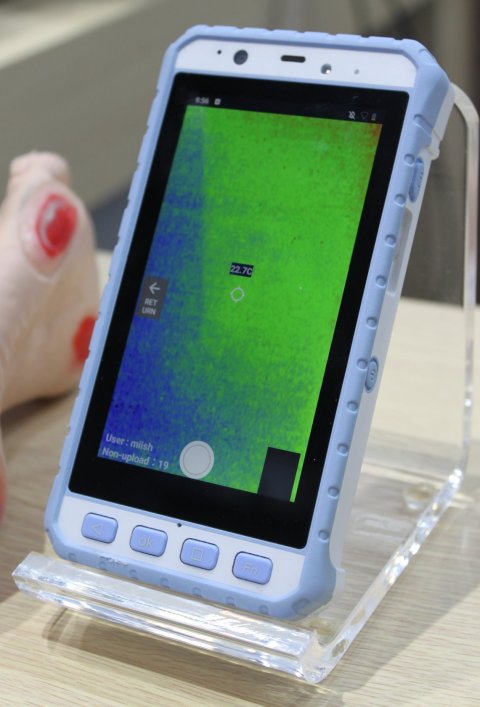
Photo: HiE/Behrends
An innovative approach to wound management was presented by Medimaging Integrated Solution Inc. (MiiS). The company, best known for their AI-enhanced retinal image analysis system “HorusScope”, gave visitors an overview of their MPD100 Wound Care System. The handheld device is equipped with three cameras, explained MiiS President and Chairman Stefan Cheng, PhD: in addition to the regular camera for wound status documentation, the system features dedicated cameras for thermal and 3D imaging. ‘Thermal information is particularly useful in examining diabetic patients,’ he said. ‘Reduced circulation is an early warning sign for diabetic foot syndrome. This results in a lowered temperature, which can be picked up by our system, to detect the condition before it has serious effects.’ The handheld design also makes the device an ideal fit for GPs visiting patients in remote areas. Relevant information on the patient and their wound can be entered directly into the system, facilitating documentation.
Pulxion Medical Technology
AI-based image analysis can pick up subtle changes in a video which escape the human eye. Startup company Pulxion makes medical use of this by applying AI and advanced image processing techniques to early detection of carotid artery stenosis (CAS), an important risk factor for stroke. Their “PulStroke” system can analyze a 20-second video of a patient’s neck, and predict their risk for developing CAS, said Pulxion CEO Joy Chen. ‘Our system, which takes as little as five minutes from the initial analysis to diagnosis, has the same diagnostic accuracy as an ultrasound scan,’ she added. This non-contact, non-invasive approach can bring greater convenience and simplicity to stroke prevention, and potentially save many lives, the CEO concluded.
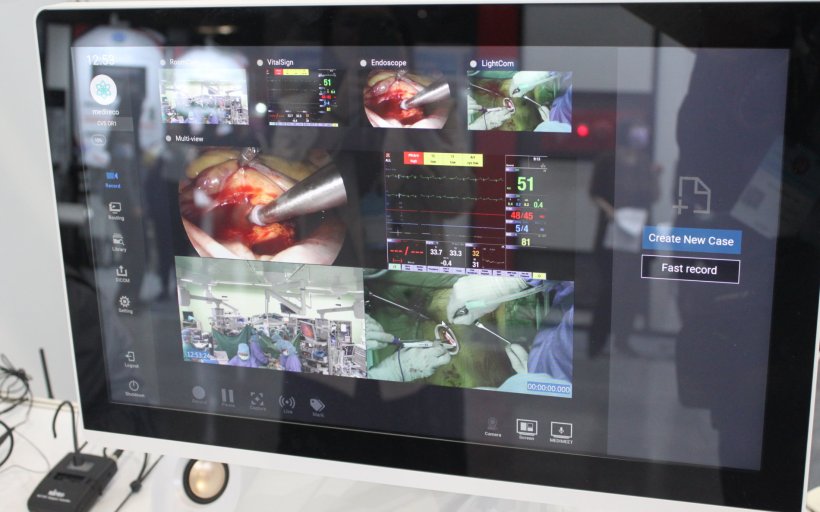
Photo: HiE/Behrends
Twin Beans Limited Corporation
Sharing medical expertise is the declared goal of Twin Beans, a company specializing in medical video integration. Their product portfolio includes solutions for recording, managing, routing and sharing videos of medical procedures, for example of highly specialized surgery. With the ability to process data from various sources, the platform can generate multi-view videos, which, for example, show the surgeon’s point of view, endoscopic feed and vital signs of the patient at the same time. The solutions are easily integrated into the HIS and can expand the hospital’s options for telemedicine. This can also be used to enhance education and review through comprehensive documentation of even complex procedures from multiple viewpoints.
V5Med Inc.
An AI-assisted software solution to enhance the speed and accuracy of lung cancer diagnoses was presented at Medical Taiwan by medical imaging specialists V5med. Available as cloud-based and on-premises models, the system automatically identifies lung nodules from 4 mm to 32 mm on CT scans and provides automatic segmentation and structured reporting services to the operator. With a built-in image comparison feature, the AI can also be used for nodule growth monitoring, explained Cooper Yang, Director of Taiwan Sales at V5med. Easy integration into existing DICOM or PACS viewers and HIS infrastructure further contribute to freeing up physicians’ time.
Winnoz Technology, Inc.
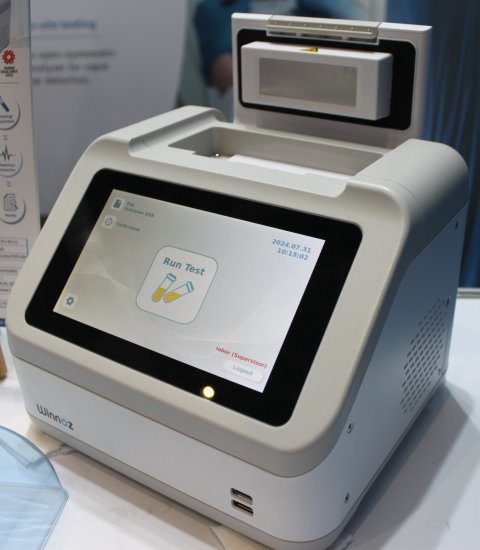
Photo: HiE/Behrends
A vacuum-assisted system for blood microsampling and a portable molecular testing platform took center stage at the booth of Taiwanese company Winnoz. Specialized in decentralized healthcare and biosensing technology, the solutions are designed to reduce laboratory workloads and enhance point-of-care testing (POCT). The eGGi Molecular Detection System is a highly customizable platform with an intuitive user interface and quick turnaround times, said Jesse Juang, the company’s Sales Representative. Complementing the system, the Haiim blood microsampling device was also on display at the medical, health and care expo. The portable solution is designed to enhance accessibility to healthcare services, providing a quick and easy way to acquire blood samples, even in remote or rural areas.
(WB)
15.07.2025



